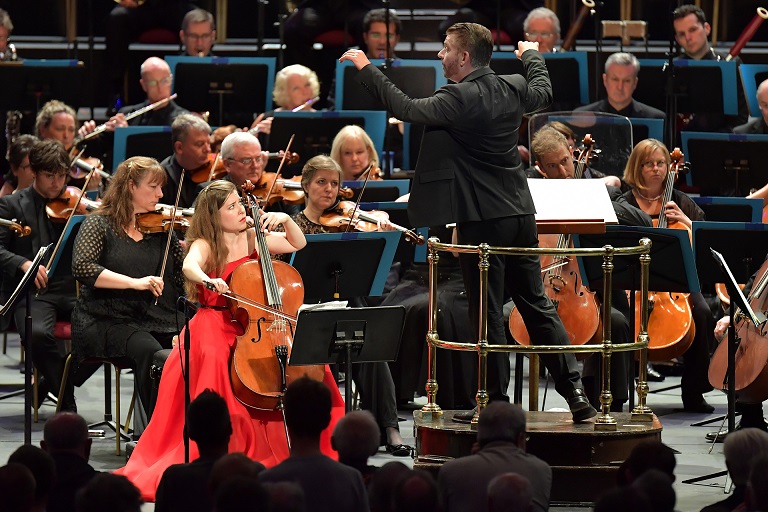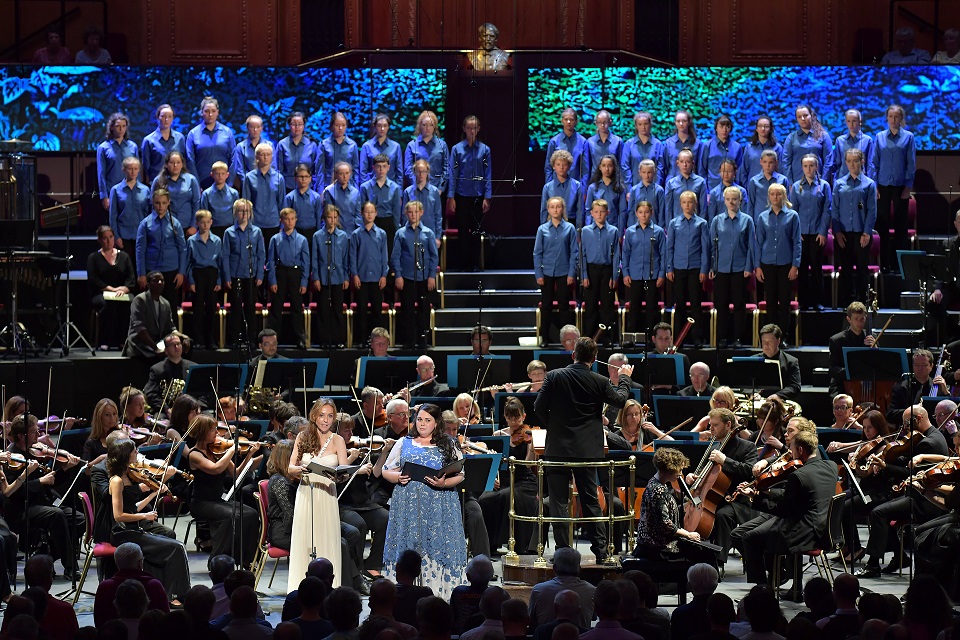Prom 48: Weilerstein, BBC Scottish SO, Pintscher | reviews, news & interviews
Prom 48: Weilerstein, BBC Scottish SO, Pintscher
Prom 48: Weilerstein, BBC Scottish SO, Pintscher
Orchestral walks on the wild side - shame about the Shakespeare
If you go down to the woods today, to be sure of a big surprise is a contradiction in terms, but this pair of sylvan adventures by Matthias Pintscher and Mendelssohn was another example of the discreetly sensitive programme-building which has distinguished the present season of BBC Proms.
Cello concertos have been a theme. Two in the last week alone (from Charlotte Bray and Colin Matthews) alongside classics by Elgar (at the First Night) and Haydn, played in yesterday’s matinee Prom by Narek Hakhnazaryan and the Ulster Orchestra. Pintscher's Reflections on Narcissus falls between them: written a decade ago, it has notched up performances across the US and Europe and has two commercial recordings to its name. Advocacy from the likes of Alisa Weilerstein (pictured below) has set the concerto beyond the merely intriguing on the path towards a hold on the repertoire.

A dramatically obvious but fitting five-movement structure opens out to a long and lovely look-at-me cantilena, then death and transfiguration. Even battling the orchestra, often teetering on the snowline of her instrument, Weilerstein made her cello bloom and swell gorgeously against an exotic orchestral voluptuary, ”steaming, monstrous, rank – a kind of primeval wilderness” as Gustave Aschenbach envisioned amid the Bavarian gravestones before setting off to meet his death in Venice.
The BBC Scottish Symphony Orchestra had evidently mastered a tricky score, which the composer directed with assurance. Pintscher and the BBCSSO have worked together for several years: there have been impressive broadcasts of dynamically contoured Schubert and Schumann alongside new works. For whatever reason, the incidental music to A Midsummer Night’s Dream did not meet those standards.
 Every miraculously deft note Mendelssohn wrote for the play was presented in a version created in 2011 by Gerard McBurney. All the main characters were touched in by an adaptable, hard-working cast; Katharine Broderick projected each bright vowel and tongue-twisting consonant of “You spotted snakes”, joined by Clara Mouriz and backed with impeccable diction by the Finchley Children’s Music Group (pictured above).
Every miraculously deft note Mendelssohn wrote for the play was presented in a version created in 2011 by Gerard McBurney. All the main characters were touched in by an adaptable, hard-working cast; Katharine Broderick projected each bright vowel and tongue-twisting consonant of “You spotted snakes”, joined by Clara Mouriz and backed with impeccable diction by the Finchley Children’s Music Group (pictured above).
And “the pert and nimble spirit of mirth”, where was she? Simply not enough time had been found or care taken to take the hour-long sequence beyond a base camp of (mostly) the right notes and words. Learning the lines would have helped. There was some ACTING, a lot of delivery, and a deal too much respect paid to the music. Over and around it tiptoed the six actors in an archly regular sing-song metre, as if fearful of disrupting its cadences, when they might profitably have been looking after Shakespeare and leaving Mendelssohn to fend for himself.
Perhaps in search of a darkness in the score to complement his own work, Pintscher set some surprisingly comfortable speeds, which worked against the necessary flick of precision to Mendelssohn’s chording and left the overture pedestrian, the Scherzo neat but routine, the Wedding March lumpen. The turbulent interlude of the Nocturne was urged on with the large and somewhat helpless gestures of a conductor who knows he needs another three hours of work to approach the ideal.
rating
Share this article
The future of Arts Journalism
You can stop theartsdesk.com closing!
We urgently need financing to survive. Our fundraising drive has thus far raised £49,000 but we need to reach £100,000 or we will be forced to close. Please contribute here: https://gofund.me/c3f6033d
And if you can forward this information to anyone who might assist, we’d be grateful.

Subscribe to theartsdesk.com
Thank you for continuing to read our work on theartsdesk.com. For unlimited access to every article in its entirety, including our archive of more than 15,000 pieces, we're asking for £5 per month or £40 per year. We feel it's a very good deal, and hope you do too.
To take a subscription now simply click here.
And if you're looking for that extra gift for a friend or family member, why not treat them to a theartsdesk.com gift subscription?
more Classical music
 Solomon, OAE, Butt, QEH review - daft Biblical whitewashing with great choruses
Even a top soprano and mezzo can’t make this Handel paean wholly convincing
Solomon, OAE, Butt, QEH review - daft Biblical whitewashing with great choruses
Even a top soprano and mezzo can’t make this Handel paean wholly convincing
 Two-Piano Gala, Kings Place review - shining constellations
London Piano Festival curators and illustrious friends entertain and enlighten
Two-Piano Gala, Kings Place review - shining constellations
London Piano Festival curators and illustrious friends entertain and enlighten
 Echo Vocal Ensemble, Latto, Union Chapel review - eclectic choral programme garlanded with dance
Beautiful singing at the heart of an imaginative and stylistically varied concert
Echo Vocal Ensemble, Latto, Union Chapel review - eclectic choral programme garlanded with dance
Beautiful singing at the heart of an imaginative and stylistically varied concert
 Scott, Irish Baroque Orchestra, Whelan, RIAM, Dublin review - towards a Mozart masterpiece
Characteristic joy and enlightenment from this team, but a valveless horn brings problems
Scott, Irish Baroque Orchestra, Whelan, RIAM, Dublin review - towards a Mozart masterpiece
Characteristic joy and enlightenment from this team, but a valveless horn brings problems
 Classical CDs: Voice flutes, flugelhorns and froth
Baroque sonatas, English orchestral music and an emotionally-charged vocal recital
Classical CDs: Voice flutes, flugelhorns and froth
Baroque sonatas, English orchestral music and an emotionally-charged vocal recital
 Kanneh-Mason, Britten Sinfonia, Shave, Milton Court - a grin and a big beaming smile
A pair of striking contemporary pieces alongside two old favourites
Kanneh-Mason, Britten Sinfonia, Shave, Milton Court - a grin and a big beaming smile
A pair of striking contemporary pieces alongside two old favourites
 theartsdesk at the New Ross Piano Festival - Finghin Collins’ musical rainbow
From revelatory Bach played with astounding maturity by a 22 year old to four-hand jazz
theartsdesk at the New Ross Piano Festival - Finghin Collins’ musical rainbow
From revelatory Bach played with astounding maturity by a 22 year old to four-hand jazz
 First Person: Manchester Camerata's Head of Artistic Planning Clara Marshall Cawley on questioning the status quo
Five days of free events with all sorts of audiences around Manchester starts tomorrow
First Person: Manchester Camerata's Head of Artistic Planning Clara Marshall Cawley on questioning the status quo
Five days of free events with all sorts of audiences around Manchester starts tomorrow
 Goldscheider, Brother Tree Sound, Kings Place review - music of hope from a young composer
Unusual combination of horn, strings and electronics makes for some intriguing listening
Goldscheider, Brother Tree Sound, Kings Place review - music of hope from a young composer
Unusual combination of horn, strings and electronics makes for some intriguing listening
 theartsdesk Q&A: composer Donghoon Shin on his new concerto for pianist Seong-Jin Cho
Classical music makes its debut at London's K-Music Festival
theartsdesk Q&A: composer Donghoon Shin on his new concerto for pianist Seong-Jin Cho
Classical music makes its debut at London's K-Music Festival

Add comment